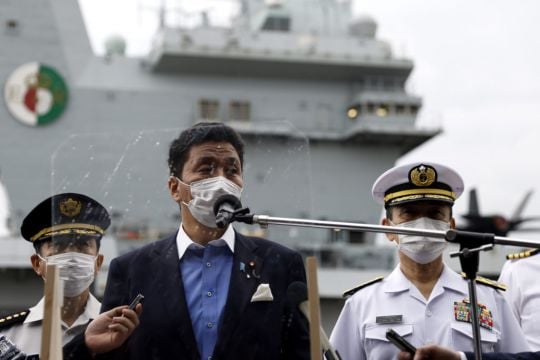Japan’s cabinet has approved a 770 billion yen (€5.9 billion) request for an extra defence budget through to March to speed up the purchase of missiles, anti-submarine rockets and other weapons, amid rising concern over the escalation of military activities by China, Russia and North Korea.
The request, still pending parliamentary approval, brings Japan’s military spending for the current year to a new high of more than 6.1 trillion yen, up 15 per cent from 5.31 trillion yen in 2020.
The countries' defence ministry says its “defence power reinforcement and acceleration package” is designed to speed up deployment of some key equipment from the 2022 budget request. The goal is to beef up Japan’s defences against North Korea’s missile threat and China’s increasingly assertive maritime activity around remote Japanese south-western islands, officials said.
Joint military activities
Japan has also raised concerns over recent joint military activities by China and Russia near its waters and airspace.
This week, a fleet of two Chinese H-6 fighters and two Russian Tu-95s flew from the Sea of Japan to the East China Sea and to the Pacific Ocean, triggering Japanese Self-Defence Force jets to scramble, the defence minister, Nobuo Kishi, said.
The budget request includes nearly 100 billion yen for the advanced version of PAC-3 mobile surface-to-air missile interceptors and related equipment, as well as cruise missiles.
Separately, more than 800 billion yen will go to speed up the purchase of reconnaissance planes and equipment, including three P-1s, equipment for P-3Cs and vertical launch systems to be placed on two destroyers, to step up surveillance around Japan’s territorial waters and airspace.
Japan has been stepping up defences in its south-western regions and islands, including Ishigaki Island, where a new military base with a land-to-sea missile defence system will be operational. Ishigaki is north of the uninhabited Japanese-controlled Senkaku Islands, which are also claimed by China, which calls them Diaoyu.
Tokyo regularly protests against the Chinese coast guard’s presence near Senkaku Islands.
The ministry also plans to build housing for ground troops on Ishigaki Island.
The combined budget for 2021 will be just over 1 per cent of Japan’s GDP, keeping its customary cap. Prime minister Fumio Kishida has said he is open to doubling Japan’s military spending to cope with the worsening security environment.
The extra budget also aims to ease the burden on Japanese defence equipment and parts suppliers that are struggling to maintain the country’s dwindling industry, officials said.
Critics say Japan, as the world’s fastest-ageing country with a shrinking population, should allocate more money towards healthcare and other services.
Japan’s military spending and capabilities have grown continuously since former Prime Minister Shinzo Abe took office in December 2012, and has since risen by 17 per cent. Abe’s government allowed Japan’s military to be more involved in international affairs by adopting a new interpretation in 2015 of the war-renouncing Article 9 of the constitution.







